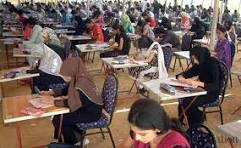FEDERAL PUBLIC SERVICE COMMISSION COMPETITIVE EXAMINATION – 2019
ENGLISH (PRECIS & COMPOSITION)
|
TIME ALLOWED: THREE HOURS PART-I(MCQS): MAXIMUM 30 MINUTES |
PART-I (MCQS) MAXIMUM MARKS = 20 PART-II MAXIMUM MARKS = 80 |
|
NOTE: (i) Part II is to be attempted on the separate Answer Book. (ii) Attempt ALL questions from PART II. (iii) All the parts (if any) of each Question must be attempted at one place instead of at different places. (iv) Write Q. No. in the Answer Book in accordance with Q. No. in the Q.Paper. (v) No Page/Space be left blank between the answers. All the blank pages of the Answer Book must be crossed. (vi) Extra attempts of any question or any part of the question will not be considered. |
|
FOR BETTER UNDERSTANDING/ASSIMILATION I ATTEMPTED /PREPARED SOME OF THE PREVIOUS PAPERS. SHARE THESE SUBSEQUENTLY FOR THE ASPIRANTS TO TAKE ADVANTAGE OF INCOMING EXAMINATIONS.
PART-II

Q No 2. Write a précis of the following passage and also suggest a suitable title. (20)
I think modern educational theorists are inclined to attach too much importance to the negative virtue of not interfering with children, and too little to the positive merit of enjoying their company. If you have the sort of liking for children that many people have for horses or dogs, they will be apt to respond to your suggestions, and to accept prohibitions, perhaps with some good-humoured grumbling, but without resentment. It is no use to have the sort of liking that consists in regarding them as a field for valuable social endeavour, or what amounts to the same thing as an outlet for power-impulses. No child will be grateful for an interest in him that springs from the thought that he will have a vote to be secured for your party or a body to be sacrificed to king and country. The desirable sort of interest is that which consists in spontaneous pleasure in the presence of children, without any ulterior purpose. Teachers who have this quality will seldom need to interfere with children’s freedom, but will be able to do so, when necessary, without causing psychological damage.
Unfortunately, it is utterly impossible for over-worked teachers to preserve an instinctive liking for children; they are bound to come to feel towards them as the proverbial confectioner’s apprentice does towards macaroons. I do not think that education ought to be anyone’s whole profession: it should be undertaken for at most two hours a day by people whose remaining hours are spent away from children. The society of the young is fatiguing, especially when strict discipline is avoided. Fatigue, in the end, produces irritation, which is likely to express itself somehow, whatever theories the harassed teacher may have taught himself or herself to believe. The necessary friendliness cannot be preserved by self-control alone. But where it exists, it should be unnecessary to have rules in advance as to how “naughty” children are to be treated, since impulse is likely to lead to the right decision, and almost any decision will be right if the child feels that you like him. No rules, however wise, are a substitute for affection and tact.
- A. The passage argues that the best way to educate children is to have a genuine liking for them, rather than to interfere with their freedom or to use them for ulterior motives. The passage also suggests that education should not be a full-time profession, as it can cause fatigue and irritation in teachers, who may lose their natural friendliness and affection for children. The passage concludes that no rules can replace the positive influence of a teacher who enjoys the company of children and treats them with impulse and tact.
Title: The Importance of Liking Children in Education
Q No 3. Read the following passage carefully and answer the questions that follow: (20)
When I returned to the common the sun was setting. The crowd about the pit had increased, and stood out black against the lemon yellow of the sky-a couple of hundred people, perhaps. There were raised voices, and some sort of struggle appeared to be going on about the pit. Strange imaginings passed through my mind. As I drew nearer I heard Stent’s voice: “Keep back! Keep back!” A boy came running towards me. “It’s movin’,” he said to me as he passed; “it’s screwin’ and screwin’ out. I don’t like it. I’m goin’ home, I am.” I went on to the crowd. There were really, I should think, two or three hundred people elbowing and jostling one another, the one or two ladies there being by no means the least active. “He’s fallen in the pit!” cried someone. “Keep back!” said several. The crowd swayed a little, and I elbowed my way through. Everyone seemed greatly excited. I heard a peculiar humming sound from the pit. “I say!” said Ogilvy. “Help keep these idiots back. We don’t know what’s in the confounded thing, you know!” I saw a young man, a shop assistant in Woking I believe he was, standing on the cylinder and trying to scramble out of the hole again. The crowd had pushed him in. The end of the cylinder was being screwed out from within. Nearly two feet of shining screw projected. Somebody blundered against me, and I narrowly missed being pitched onto the top of the screw. I turned, and as I did so the screw must have come out, for the lid of the cylinder fell upon the gravel with a ringing concussion. I stuck my elbow into the person behind me, and turned my head towards the Thing again. For a moment that circular cavity seemed perfectly black. I had the sunset in my eyes. I think everyone expected to see a man emerge-possibly something a little unlike us terrestrial men, but in all essentials a man. I know I did. But, looking, I presently saw something stirring within the shadow: greyish billowy movements, one above another, and then two luminous disks-like eyes. Then something resembling a little grey snake, about the thickness of a walking stick, coiled up out of the writhing middle, and wriggled in the air towards me-and then another. A sudden chill came over me. There was a loud shriek from a woman behind. I half turned, keeping my eyes fixed upon the cylinder still, from which other tentacles were now projecting, and began pushing my way back from the edge of the pit. I saw astonishment giving place to horror on the faces of the people about me. I heard inarticulate exclamations on all sides. There was a general movement backwards. I saw the shopman struggling still on the edge of the pit. I found myself alone, and saw the people on the other side of the pit running off, Stent among them. I looked again at the cylinder and ungovernable terror gripped me. I stood petrified and staring. A big greyish rounded bulk, the size, perhaps, of a bear, was rising slowly and painfully out of the cylinder. As it bulged up and caught the light, it glistened like wet leather. Two large dark-coloured eyes were regarding me steadfastly. The mass that framed them, the head of the thing, was rounded, and had, one might
|
say, a face. There was a mouth under the eyes, the lipless brim of which quivered and panted, and dropped saliva. The whole creature heaved and pulsated convulsively. A lank tentacular appendage gripped the edge of the cylinder, another swayed in the air. Those who have never seen a living Martian can scarcely imagine the strange horror of its appearance. The peculiar V-shaped mouth with its pointed upper lip, the absence of brow ridges, the absence of a chin beneath the wedge like lower lip, the incessant quivering of this mouth, the Gorgon groups of tentacles, the tumultuous breathing of the lungs in a strange atmosphere, the evident heaviness and painfulness of movement due to the greater gravitational energy of the earthabove all, the extraordinary intensity of the immense eyes-were at once vital, intense, inhuman, crippled and monstrous. There was something fungoid in the oily brown skin, something in the clumsy deliberation of the tedious movements unspeakably nasty. Even at this first encounter, this first glimpse, I was overcome with disgust and dread. Questions1:What leads us to believe that this passage is from a science fiction story? (4) 2. How was the crowd behaving? (4) 3. Why did the mood of the crowd alter? (4) 4. What was the narrator’s initial reaction to the “Thing”? (4) 5. Why did the writer feel disgusted? (4) The passage is an excerpt from the novel The War of the Worlds by H.G. Wells, published in 1898. It is a science fiction story that depicts the invasion of Earth by Martians, who arrive in metal cylinders and use advanced weapons and machines to destroy and enslave humanity. The passage describes the first encounter between the narrator, a journalist, and one of the Martians, who emerges from the cylinder that has landed in a common near Woking, England. The passage creates a sense of suspense, horror, and curiosity, as the narrator and the crowd witness the strange and terrifying appearance and behavior of the alien creature. The passage also contrasts the reactions of the people, who range from curiosity to fear to panic, and the calm and steady gaze of the Martian, who seems to regard them as insignificant. The passage uses vivid imagery, descriptive language, and similes to convey the physical and emotional details of the scene. For example, the narrator compares the Martian’s eyes to “luminous disks”, its mouth to a “V-shaped” slit, and its movements to a “grey snake” and a “big greyish rounded bulk”. The passage also uses sound effects, such as the “peculiar humming” of the cylinder, the “ringing concussion” of the lid, the “loud shriek” of the woman, and the “inarticulate exclamations” of the crowd, to create a sense of drama and tension. The passage also uses repetition, such as the phrase “Keep back!”, to emphasize the danger and urgency of the situation. The passage is an example of Wells’ imaginative and influential style of science fiction, which combines scientific speculation, social commentary, and human interest123 The answers to questions: 1. What leads us to believe that this passage is from a science fiction story?
2. How was the crowd behaving?
3. Why did the mood of the crowd alter?
4. What was the narrator’s initial reaction to the “Thing”?
5. Why did the writer feel disgusted?
|
|
|
Q. 4. |
Correct the following: (10) (i) He enjoyed during the holidays. (ii) None of the boys had learnt their lesson. (iii) He is abusing the money of his father. (iv) I regret at the delay. (v) I could not help but laugh. (vi) I always have and always shall be your friend. (vii) I was out walking when I saw the new moon in the garden. (viii) He cried as if he was mad. A. Here are the possible corrections for the following sentences: (i) He enjoyed himself during the holidays. (The verb enjoy is transitive and requires an object.) (ii) None of the boys has learned his lesson. (The word none is singular and agrees with a singular verb and pronoun.) (iii) He is wasting the money of his father. (The word abusing is not appropriate in this context, as it implies mistreatment or violence.) (iv) I regret the delay. (The preposition at is not used with the verb regret.) (v) I could not help laughing. (The verb help is followed by a gerund, not an infinitive.) (vi) I have always been and always will be your friend. (The verb tenses should be consistent and logical.) (vii) I was out walking when I saw the new moon in the sky. (The moon cannot be seen in the garden unless it is a metaphor or a decoration.) (viii) He cried as if he were mad. (The subjunctive mood is used after as if to express a hypothetical or unreal situation.) Some other common errors in English grammar and usage are:
These are some of the common errors in English grammar and usage that you can avoid by checking your writing carefully and using reliable tools or resources. For more information, you can refer to these sources12345.
|
|
Q.5. |
Punctuate the following text, where necessary. (5) a hungry lion slipped out of the forest into a barnyard one evening when he saw a plump donkey his mouth began to water but just as he was ready to jump on the donkey a rooster crowed he was frightened and so turned away into the forest again hey look at that cowardly lion the donkey brayed to the rooster i am going to chase him and the donkey ran after the lion wait the rooster shouted you dont know that but it was too late the lion had turned and killed the donkey ah my poor stupid friend the rooster said as he watched the lion eating the donkey the lion wasnt afraid of you but of my crowing A. The text with the necessary punctuation: A hungry lion slipped out of the forest into a barnyard one evening. When he saw a plump donkey, his mouth began to water. But just as he was ready to jump on the donkey, a rooster crowed. He was frightened and so turned away into the forest again. “Hey, look at that cowardly lion!” the donkey brayed to the rooster. “I am going to chase him.” And the donkey ran after the lion. “Wait!” the rooster shouted. “You don’t know that!” But it was too late. The lion had turned and killed the donkey. “Ah, my poor stupid friend,” the rooster said as he watched the lion eating the donkey. “The lion wasn’t afraid of you, but of my crowing.” (a) Rewrite the following sentences (ONLY FIVE) after filling in the blanks with appropriate prepositions. (5) (i) What time do we arrive our destination? (ii) We are flying some rough weather; please fasten your seat belts. (iii) It is warming up; noon we should be able to go swimming. (iv) My parents are not responsible my actions. (v) This pan is cooking omelettes. (vi) poor attendance, this course is being cancelled. (vii) The police took the men in questioning. (viii) The woman you gave the book is my aunt. A. Sentences with the appropriate prepositions filled in: (i) What time do we arrive at our destination? (ii) We are flying through some rough weather; please fasten your seat belts. (iii) It is warming up; by noon we should be able to go swimming. (iv) My parents are not responsible for my actions. (v) This pan is for cooking omelettes. (vi) Due to poor attendance, this course is being cancelled. (vii) The police took the men in for questioning. (viii) The woman you gave the book to is my aunt.
|
|
Q.6. |
Use ONLY FIVE of the following in sentences which illustrate their meanings. (10) (i) To cast pearls before swine (ii) To step into one’s shoes (iii) Stuff and nonsense (iv) A wild goose chase (v) To be ill at ease (vi) Sit on the fence (vii) In a jiffy (viii) To preen oneself A. Sentences that illustrate the meanings of the following phrases: (i) To cast pearls before swine means to offer something valuable to someone who does not appreciate or deserve it. For example, “He gave her a diamond ring, but she threw it away. He was casting pearls before swine.” (ii) (ii) To step into one’s shoes means to take over someone’s role or position, especially when they are absent or unable to continue. For example, “When the manager resigned, she had to step into his shoes and run the company.” (iii) (iii) Stuff and nonsense means something foolish or absurd, and not worth considering or believing. For example, “He claims that he can fly, but that’s just stuff and nonsense.” (iv) A wild goose chase means a futile or hopeless pursuit of something impossible or unlikely to be found or achieved. For example, “He spent years looking for his long-lost brother, but it was a wild goose chase.” (v) (v) To be ill at ease means to feel uncomfortable, nervous, or anxious. For example, “She was ill at ease in the crowded party, and wanted to go home.” (vi) To sit on the fence means to avoid making a decision or taking a side in a dispute or controversy. For example, “He refused to vote for either candidate and preferred to sit on the fence.” (vii) (vii) In a jiffy means in a very short time or very quickly. For example, “I’ll be back in a jiffy, just wait for me here.” (viii) (viii) To preen oneself means to groom or dress oneself with care and attention, especially to show off or impress others. For example, “She spent hours preening herself in front of the mirror, before going to the party.”
|
|
|
|

